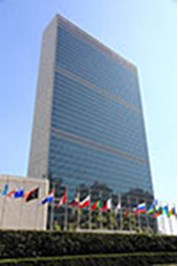United Nations Negotiating Guide

ONLINE EDITION
Introduction
Documents
Index
Abridged Guide to Family Issues
Our United Nations Negotiating Guide, compiled by Susan Roylance and published jointly with United Families International, is the indispensable Bible of pro-family delegates and advocates in the United Nations. The following are only a few of the rave reviews it has received.
“The Negotiating Guide is a phenomenal store of needed documentation, indexing and cross-referencing of UN documents relating to the family. It will be great use, not only for the pro-family movement, but also for UN professionals, who themselves have a very hard time finding their way around the UN’s own website, which at times seems more designed to confuse than to help. Here is one resource that everyone will welcome. It marks a new day in the family’s defense of its own at the UN, and is an indication of its growing sophistication in that defense.” —Patrick F. Fagan
“The Pro-Family Negotiating Guide is a tremendous resource for NGOs, governments, scholars and journalists who want to make use of United Nations documents that relate to family issues. As this tool becomes widely available, it will be possible for people of good will to maintain the integrity of UN documents and to prevent their hijacking for ideological purposes.” —Concerned Women for America
“This compilation is a godsend. It makes easily accessible UN statements on the full range of topics relevant to the family. I will use it, and use it often. I urge you to do the same.” —William Saunders
“Be assured that this document will be used by pro-life lobbyists and diplomats from around the world during actual UN conferences. It is an invaluable guide that the professionals will plumb constantly.” —Austin Ruse
“This book is an invaluable aid for those who desire to support and strengthen the family- and life-based norms that have undergirded every successful society in human history. The book provides, not only the source documents used to forge new international norms, but a topic-by-topic discussion of the most distressing (and debatable) social policies now being derived from these documents.” —Richard Wilkins
The Family in the United Nations
The family, as the only group unit recognized in the Universal Declaration of Human Rights as having rights, “is the natural and fundamental group unit of society and is entitled to protection by society and the State.”[1]
The family thus exists prior to the State, which is obligated to protect the family as the keystone of human rights and the irreplaceable foundation of civilization.
Accordingly, international commitments repeatedly address the nature and role of the family, beginning with its formation based on “the right of men and women of marriageable age to marry and to found a family”[2] in which “husband and wife should be equal partners.”[3]
The family thereby provides “the natural environment for the growth and well-being of all its members and particularly children,” who, “for the full and harmonious development of… [their] personality, should grow up in a family environment, in an atmosphere of happiness, love and understanding.”[4]
Governments should “develop policies and laws that better support the family,”[5] and are urged to analyze policies and programs to assess “their impact on family well-being and conditions.”[6]
In a broader sense, “Governments, the private sector, non-governmental organizations and other actors of civil society” are encouraged to “design, implement and promote family friendly policies and services.”[7]
So essential is the family that it is “entitled to receive comprehensive protection and support”[8] and must be accorded “the widest possible protection and assistance.”[9]
[1]Universal Declaration of Human Rights, 16(3).
[2]International Covenant on Civil and Political Rights, 23.2.
[3]Programme of Action of the International Conference on Population and Development, Principle 9; World Summit for Social Development, 80; United Nations Conference on Human Settlements (Habitat II), 31.
[4] Convention on the Rights of the Child, Preamble; and see World Declaration on the Survival, Protection and Development of Children, 14.
[5]Programme of Action of the International Conference on Population and Development, 5.2(a).
[6]World Summit for Social Development, 27(a).
[7]Further actions and initiatives to implement the Beijing Declaration and Platform for Action, IV.B, chapeau, and 82(d).
[8] World Summit for Social Development, 80; Programme of Action of the International Conference on Population and Development, Principle 9; Beijing Platform for Action, 29; A World Fit for Children, 15.
[9]International Covenant on Economic, Social and Cultural Rights, 10.1.

